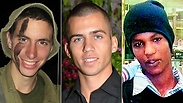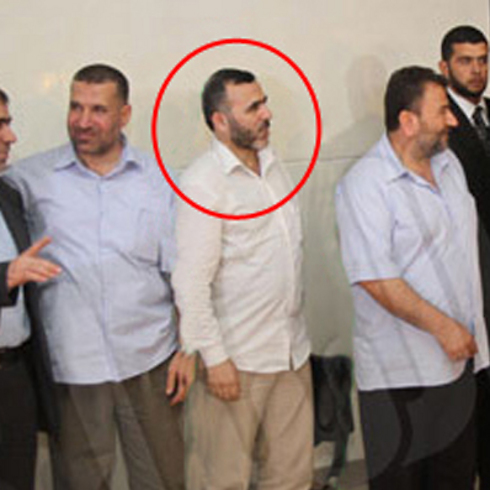
Hadar Goldin, Oron Shaul and Avra Mangisto

Hamas seeks another Shalit deal for soldiers' bodies, missing civilians
Terror group sets preconditions for negotiations: Release of 50 of its men arrested after kidnapping of 3 teens; their final goal: Release of hundreds of security prisoners in return for bodies of Oron Shaul and Hadar Goldin and civilians Avra Mangisto and Hisham al-Sayed.
Officially, Israel is not negotiating with Hamas over the return of the bodies of IDF officer Hadar Goldin
and soldier Oron Shaul,
and civilians Avra Mangisto
and Hisham al-Sayed. But Yedioth Ahronoth has learned that behind the scenes Israel has been engaging in talks through mediators, seeking to at least start a negotiation.

As it currently stands, it appears the pressure being exerted by the Shaul, Goldin and Mangisto families has not borne fruit and both Israel and Hamas remain entrenched in their positions.
"Hamas wants a 'Shalit Deal 2,' with the release of hundreds of prisoners," a senior Israeli official said, alluding to the unofficial exchanges.
But that is not the terror group's only condition. It also demands an "entry fee" to even engage in negotiations in the form of the release of 50 security prisoners arrested during "Operation Brother's Keeper," conducted in the West Bank following the kidnapping and subsequent murder of three Israeli teens.
Hamas's demand for "entry fees" was first reported by Arab newspaper Asharq Al-Awsat several months ago, and has now been confirmed for the first time by an Israeli official.
Jerusalem has rejected Hamas's demand to release prisoners as a precondition to begin the negotiations: "The public in Israel has started the difficult internal debate (about the issue) too soon," the senior official said. "We're not willing to pay for signs of life, as it means we'll have to meet any precondition."

The Goldin and Shaul families at their protest tent outside the Prime Minister's Residence (Photo: Gil Yohanan)
Israel, the mediators were told, was no longer willing to pay a high price in prisoner exchange deals particularly in light of the fact that, in the case of Goldin and Shaul, there is no doubt that the negotiation will be over bodies.
"The attempt to tie the agreement with Turkey to the talks for the return of the bodies and the release of the civilians is not relevant, and shows the lack of understanding of the other side," the official explained.
Israel is dealing, in this case, with the heads of Hamas's military wing—not with the organization's political leadership—and it is they who are responsible first and foremost for the prisoners. Among the three Hamas heads managing the negotiations is Yahya Sinwar, who was imprisoned in Israeli jail and released as part of the Shalit prisoner exchange deal. He, more than the others, understands the prisoners' situation. The other two negotiators are Marwan Issa, considered Hamas's deputy military chief, and Ruhi Mushtaha.
Hamas's military wing is not interested in the construction of a Gaza sea port, nor the easing of the military blockade over the Strip. Sinwar takes a radical stance on the issue and is not willing to discuss anything but the release of security prisoners.
In 2011, IDF soldier Gilad Shalit was released from captivity in Gaza after more than five years in return for, 1,027 prisoners, 58 of whom were released to the West Bank. In June 2014, after the kidnapping of the three Israeli teens, these prisoners were arrested again and charged with violating their parole by committing offenses. Since then, eight have been released while 50 are still imprisoned and kept in special cell blocks.
Israeli officials have said that while the precondition of releasing these prisoners is not on the table, Sinwar can still improve the conditions of 1,500 Hamas prisoners in Israeli jails in what is defined as a gesture of goodwill by Israel.
Among the things Israel is willing to put on the negotiating table is the formulation of arrangements for the exchange of prisoners and bodies at the end of military campaigns.
"We can talk about" the 20 prisoners arrested during Operation Protective Edge and the bodies of 20 Palestinian combatants Israel has captured during the fighting, the official said.
"Hamas is interested in exhausting us, but Israeli society has changed since the Shalit deal," he added.

















